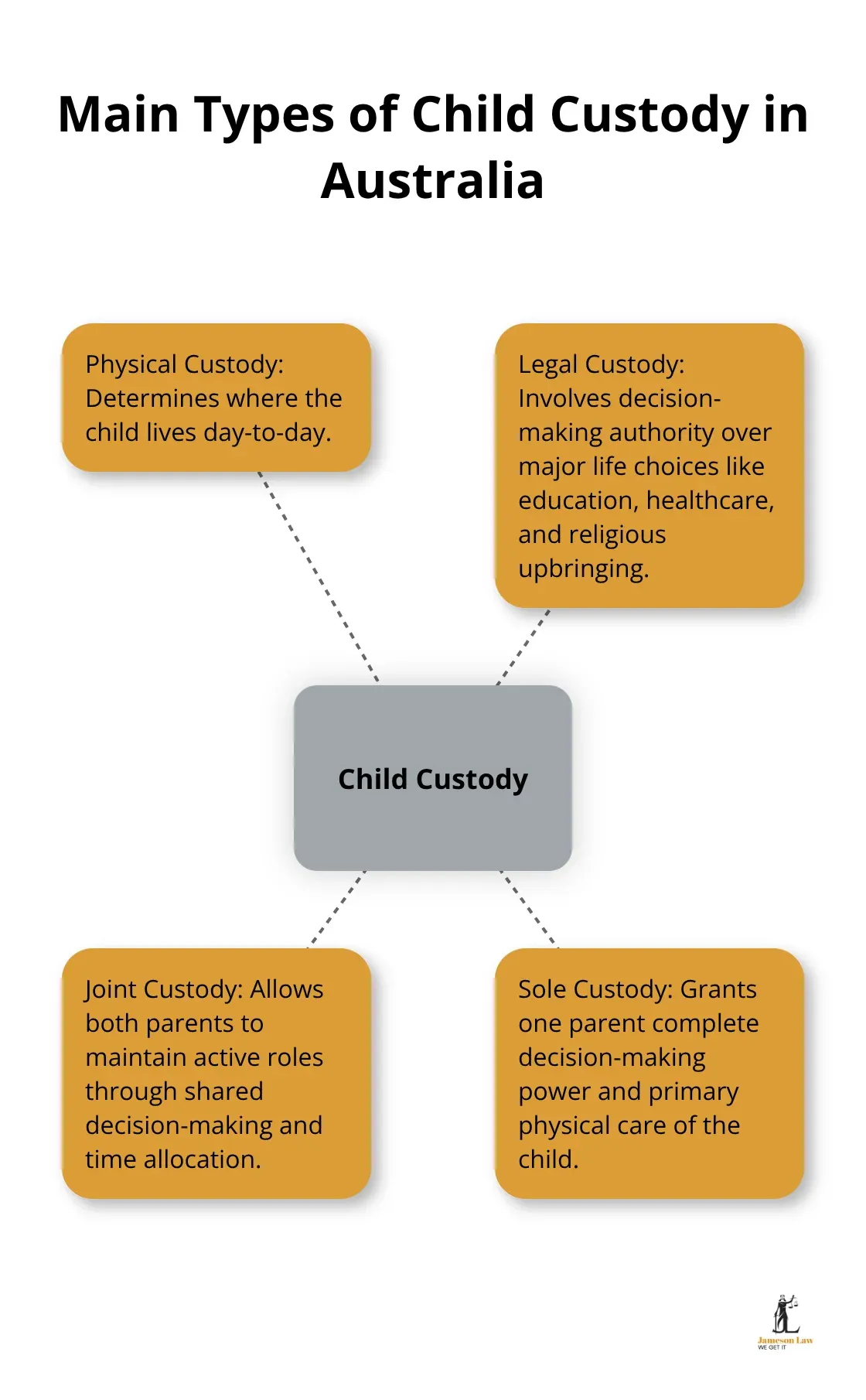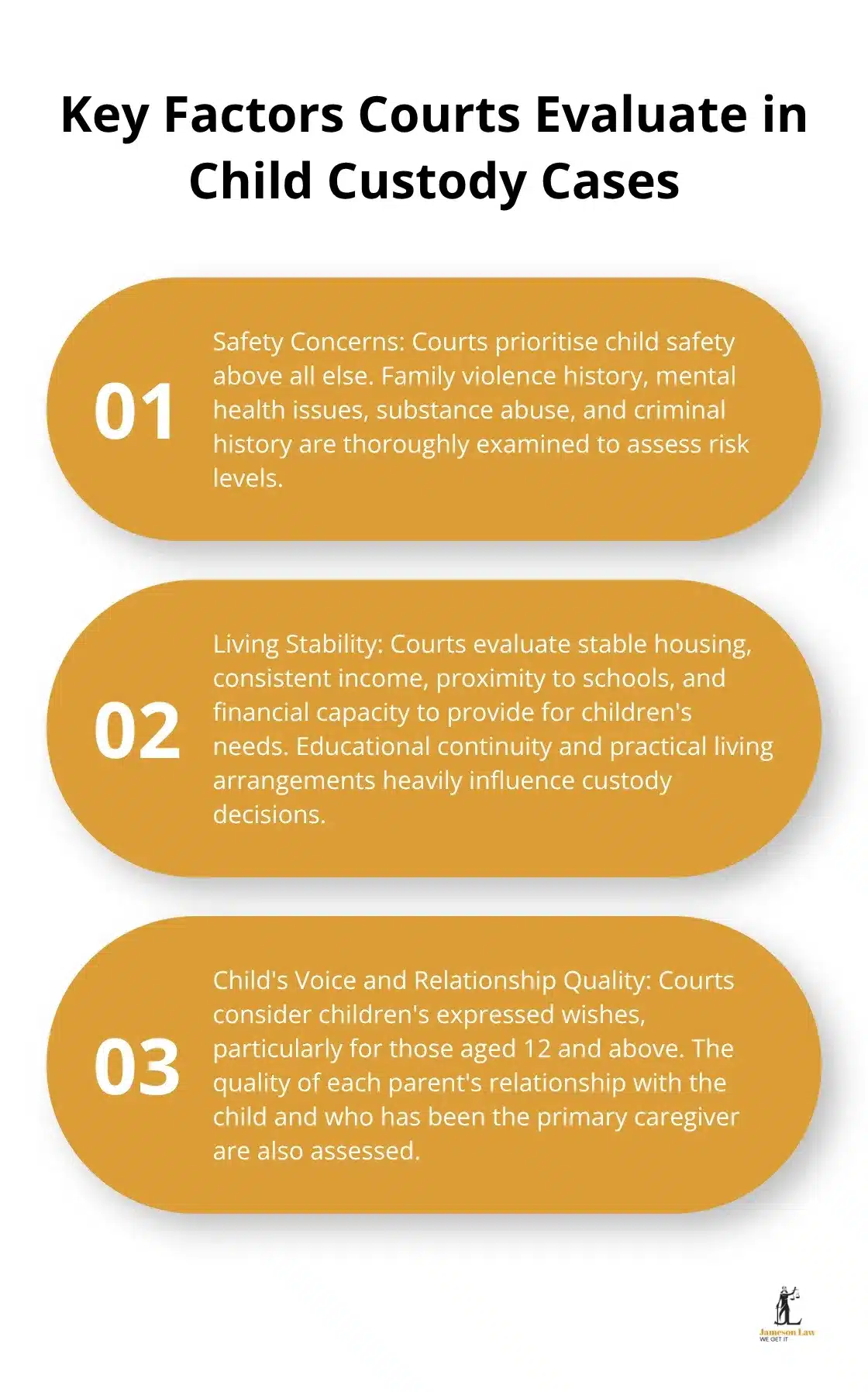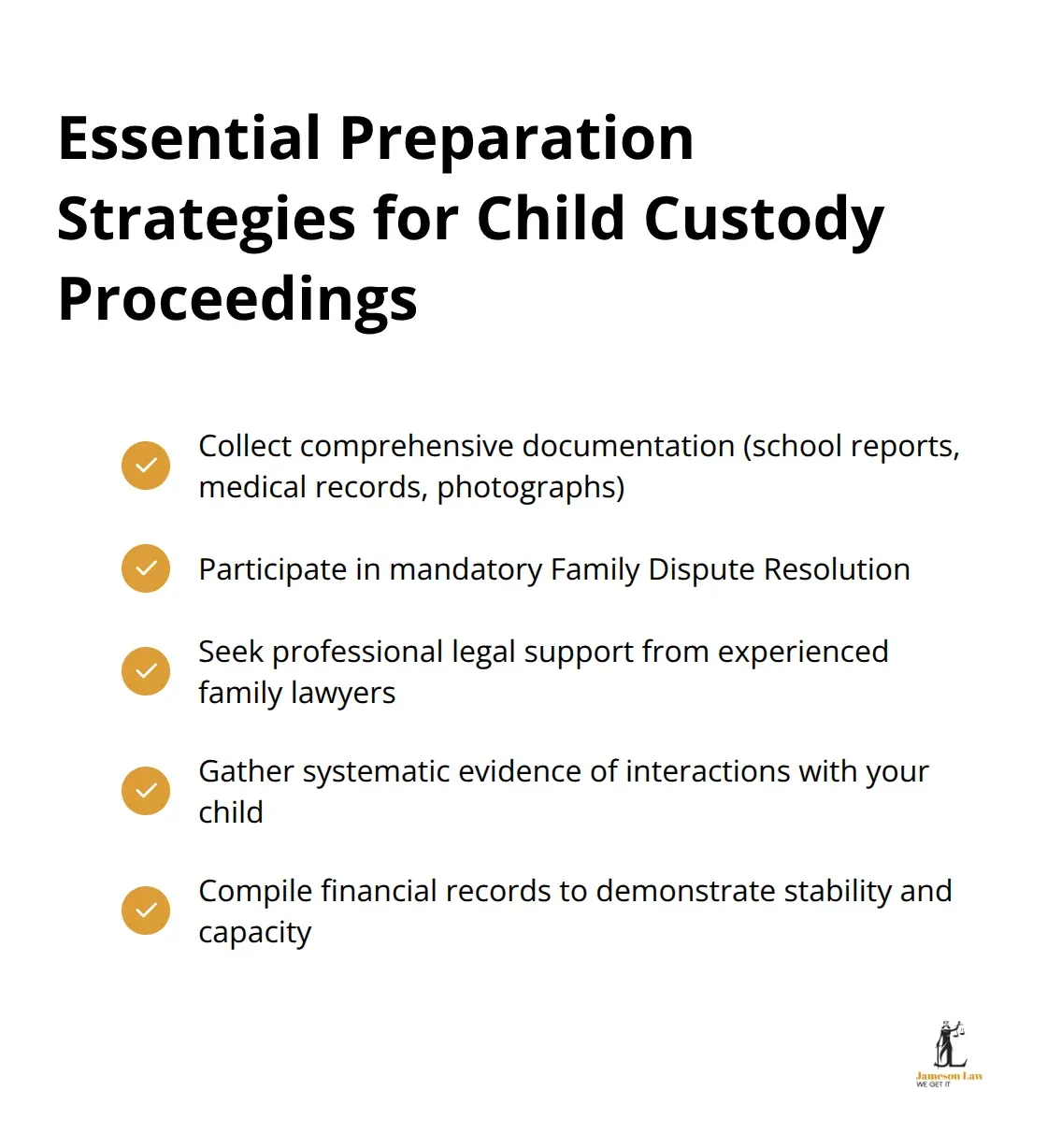Child custody battles rank among the most emotionally challenging aspects of family breakdown. Parents face complex legal decisions that will shape their children’s futures for years to come.
We at Jameson Law understand that family law child custody cases require both legal expertise and compassionate guidance. The right preparation and professional support can make the difference between a prolonged court battle and a resolution that prioritises your child’s wellbeing.
What Are the Main Types of Child Custody?
Australian family law recognises two fundamental concepts that determine how parents share responsibilities after separation. Physical custody refers to where your child lives day to day, while legal custody involves decision-making authority over major life choices such as education, healthcare and religious upbringing. The Family Law Act 1975 requires courts to prioritise a child’s best interests above all other considerations when they determine these arrangements. See how this applies in practice with parenting orders in the Federal Circuit and Family Court of Australia (FCFCOA).

Joint Custody Creates Shared Responsibilities
Joint arrangements allow both parents to maintain active roles in their child’s life through shared decision-making and time allocation. Research from the Australian Institute of Family Studies indicates shared care can support adjustment when it is safe and practical. Joint custody works best where communication is workable and parents live within reasonable proximity. Typical patterns include alternating weeks, 2-2-3 schedules for younger children, or tailored plans around work and school needs. For help documenting your plan, compare parenting orders and consent orders.
Sole Custody Provides Single-Parent Authority
Sole custody gives one parent primary care and decision-making power where joint arrangements would risk the child’s wellbeing. Courts consider sole custody in contexts such as family violence, untreated substance misuse or where one parent has significantly greater parenting capacity. If safety is an issue, read about domestic and family violence offences and AVOs in NSW, and see the court’s safety guidance via the FCFCOA.
Parenting Orders Establish Legal Framework
Parenting orders set out living arrangements, time with each parent and who makes major decisions. These orders override informal agreements and can be enforced by the Court. Learn the process on the FCFCOA parenting orders page and discuss options such as consent orders with our team.
What Do Courts Actually Evaluate in Custody Cases
Australian courts apply a detailed framework, including the best-interests factors in section 60CC of the Family Law Act. Child safety takes priority over parental preferences. Strong, relevant evidence is essential, so preparation is critical.

Safety Concerns Override All Other Considerations
History of family violence or unacceptable risk leads to conditions like supervised time or, in serious cases, no contact. Courts consider police reports, protection orders, medical records and witness statements. For context on prevalence, see the ABS Personal Safety findings. If safety is in issue, seek advice on domestic violence matters early.
Mental health, alcohol and other drug misuse and criminal history are also relevant. Courts may require assessments and demonstrated treatment before unsupervised time is considered.
Living Stability and Practical Arrangements Matter Most
Courts look for stable housing, proximity to school, appropriate sleeping arrangements and predictable routines. Practicality matters: long travel times between homes often reduce mid-week changeovers. Educational continuity is a strong consideration. Financial capacity to meet children’s needs (health, extracurriculars, education) is part of the picture. For budgeting through separation, see Moneysmart.
Child’s Voice and Relationship Quality
Children’s views are considered with their age and maturity. The quality of each parent’s relationship carries more weight than the raw hours. Courts look at who has been the primary carer and who supports the child’s connections with the other parent. Learn how this feeds into parenting orders outcomes.
How Should You Prepare for Custody Proceedings
Evidence wins cases. Start a file of school reports, medical records, photos of your child’s room and routine, and a communication log with the other parent. Keep bank statements, pay slips and receipts for child-related expenses. For a plain-English legal starting point, visit LawAccess NSW and then get tailored advice from our child custody lawyers.

Family Dispute Resolution Must Come First
Most parenting disputes require Family Dispute Resolution before Court. Learn about services via Family Relationships Online and Relationships Australia NSW, or speak to our team about family law mediation. If mediation is unsuitable or fails, you usually need a section 60I certificate to proceed.
Professional Legal Support Determines Success
Specialist family law solicitors understand judicial expectations, evidence rules and local practice. We prepare persuasive affidavits, negotiate workable terms and, where needed, run hearings. Explore our guides on best-interests factors and consent orders, and ask about fixed-fee options for specific stages.
Evidence Collection Strategies
Document parenting time, pick-ups and drop-offs, school attendance and extracurriculars. Keep communications polite and child-focussed; assume a magistrate may read them. For child support questions alongside parenting time, see Services Australia – Child Support and our child support agreements guide.
Final Thoughts
Strong preparation, clear evidence and sensible negotiation drive better custody outcomes. Parents who complete FDR, document care and present child-centred proposals generally achieve more durable results.
Your child’s wellbeing must remain the focus. Courts prioritise safety, stability and meaningful relationships over parental preferences. For practical help tailored to your case, contact our child custody team at Jameson Law or call (02) 8806 0866 to book a confidential consultation.













